UK floods: What to do when your home is at risk
- Published
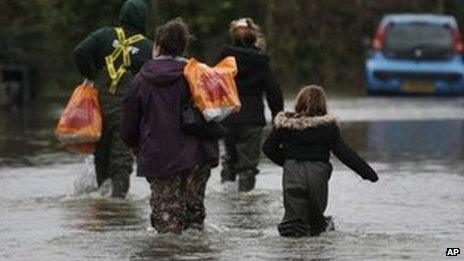
Knowing how to prepare for a flood can limit the damage to your home
The sight of homes across England and Wales being surrounded and enveloped by marauding flood waters has become all too common.
But what should victims do when the flood siren is sounded and the heavens begin to open?
And what is the first thing they should do when their homes are invaded by the floods and their belonging destroyed?
Here those closely involved with combating floods offer their guidance on what to do when flooding is on the way and how to cope in the aftermath.

Sandbag or flood board?
As the rain has come down, anxious homeowners have scrambled to stockpile sandbags in a bid to protect their homes from the advancing waters.
However, some experts warn that building a barrier of sandbags may not be the best preparation for a flood.
The Environment Agency points out that sandbags are "ineffective for groundwater flooding", even where they are cheap and easy to get hold of.
The agency says sandbags can take a long time to fill and are cumbersome to manoeuvre.
A better option may be to use "flood boards" to block doorways and air brick covers.
As flood waters approach contact your insurance provider "as soon as possible" and move as many possessions as possible upstairs as you can, the British Insurance Brokers' Association (BIBA) says.
Electricity and gas should be switched off.
The BIBA says furniture should be pulled away from walls to prevent potential further damage and warns that drying out a building can take "months" - so "don't be in a hurry to redecorate".
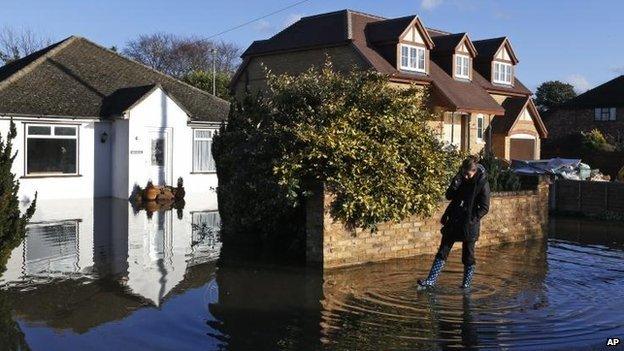
Planning ahead for flooding is crucial to minimise damage to your home

Planning for flooding
Mary Dhonau, who is often consulted on how to fight floods, a flood consultant, says the most important advice to potential flood victims is to write their own emergency household plan, external as soon as possible.
The Worcester resident, who says she has lost count of the number of times she has been flooded, has spent the last few months offering advice to those who have been flooded
When a flood warning is issued it is important to sit down and work out what you're going to do, Ms Dhonau says.
She says householders should clear an upstairs room ready to store furniture from the ground floor.
Central to the emergency plan is deciding where children and elderly relatives could stay and discussing it with everybody involved, she adds.
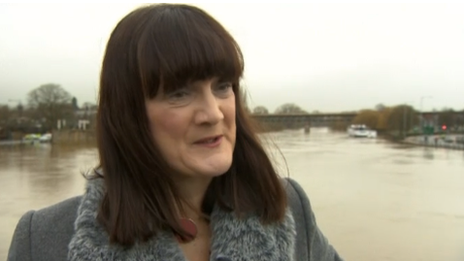
Mary Dhonau is often consulted on flood protection after her own home repeatedly flooded

If the waters come
If you're caught off-guard by flooding, your response should be mainly dictated by common sense, Ms Dhonau says.
Quickly prioritise and move your most treasured items to safety. Then grab whatever you can and move it upstairs.
Turn off all the electrics and gas and move any electrical items to safety, she says. Tie up curtains in knots so they do not hang close to the floor, and move your car to higher ground.
If you have access to sandbags then make sure they are in front of weak spots around the house. If there is time, gaffer tape some polythene sheeting to the house first.
"If the emergency services tell you to leave your home then do as you're told," she urges.
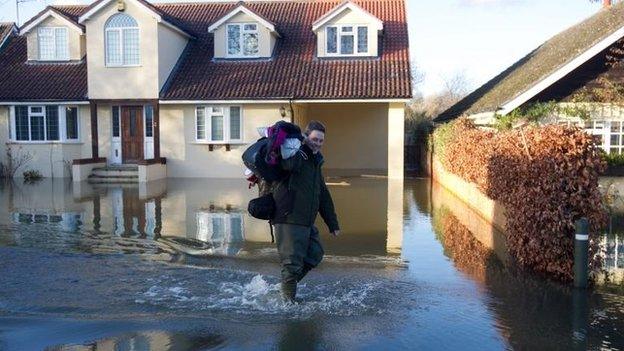
Be prepared that flooded homes can take months to repair

The cost of a flood
"There is nothing any of us can do about the forces of nature but we can all act to reduce the potential damage", says Eric Galbraith, chief executive of BIBA.
BIBA says that as long as you have an up-to-date household buildings and contents policy, you should be covered against damage by flooding.
Cars or vehicles swept up in flooding, should also be covered if you have comprehensive motor policies.
The association says the cost of alternative accommodation if your home is left inhabitable will "usually be met" by insurers, but warns you may only be covered up to a stated limit.
Flood damage to homes and businesses has cost insurers and those households who are uninsured, hundreds of millions of pounds during the last few years.
Mr Galbraith says: "It is too soon to estimate the true cost of the damage caused by this current flooding and it will take many months before the full extent of the bill facing many uninsured homeowners and insurance companies alike is known."

The aftermath
Returning to your flooded home for the first time can be very difficult. You should never do it alone and never take children with you, Mary Dhonau says.
Remember to be aware of hazards under the water and of slippery floors.
Don't touch anything without wearing gloves as you could be at risk of illness from the water.
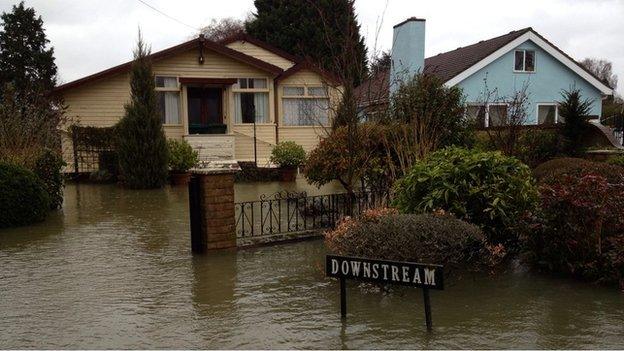
If your house is at risk of repeated flooding it might be time to consider long term protection measures
Be prepared that your home will "absolutely stink" and your belongings are likely to be covered in "filthy brown stuff", she adds.
The first thing to do is call your insurers as soon as possible and begin collecting evidence for your claim.
Take photos of everything, including the contents of your fridge and freezer.
Cut up your carpet and throw it away to help speed up the drying process. Make sure you keep a sample for your insurance claim, though.
Open all your windows.
Start looking for new accommodation quickly before it is booked up, especially if a large area has been affected by flooding.
Be prepared that it could be up to nine months until you are able to return to your home.
- Published14 February 2014
- Published14 February 2014
- Published17 February 2014